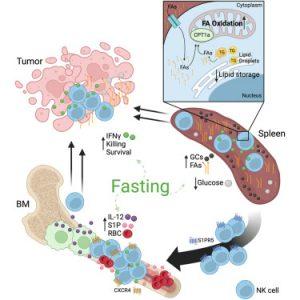Exciting new research suggests that strategic fasting periods could improve our body’s natural defenses against cancer (Figure 1). Scientists have known for some time that dietary approaches, like fasting, might starve cancer cells. This new study, however, sheds light on a different mechanism: how fasting might enhance the ability of immune cells called natural killer (NK) cells to fight cancer.
NK cells are like the body’s special forces. They can detect and destroy abnormal cells, including cancer cells, without needing prior exposure. The more NK cells present in a tumour, the better the patient’s prognosis tends to be.
The study involved mice with cancer who fasted for 24 hours, twice a week. Importantly, the mice were allowed to eat freely between fasting periods, so they maintained their weight. Interestingly, these fasting cycles had a significant impact on the NK cells.
Tumours are harsh environments, often low in glucose (sugar) but rich in fatty acids. Normally, most immune cells struggle in such a setting. What this study reveals is that fasting reprograms NK cells to thrive in this challenging environment.
Here’s the key: When the mice fasted, their bodies switched from relying on glucose for fuel to using fatty acids. This mirrored what happened in the human body – our bodies can use fatty acids as an alternative energy source when glucose is scarce. Crucially, the NK cells learned to adapt and use these fatty acids as fuel too. This is a big deal because tumours are loaded with fatty acids, and now the NK cells are better equipped to survive and fight within the tumor itself.
The researchers observed another interesting effect. Fasting caused some NK cells to migrate to the bone marrow. There, they encountered high levels of a signaling protein called Interleukin-12, which essentially primed them to produce more Interferon-gamma, a molecule crucial for fighting tumors. Meanwhile, other NK cells in the spleen underwent a separate reprogramming, further enhancing their ability to use fatty acids for fuel.
The combined effect? NK cells prepped to produce more anti-tumor weaponry and better equipped to survive the battlefield within a tumor. While the study focused on mice, human blood samples from cancer patients showed similar trends – fasting reduced the number of circulating NK cells, suggesting a potential parallel effect in humans.
This research is in its early stages, but it offers a fascinating glimpse into how dietary interventions, like fasting, could potentially work alongside traditional cancer treatments. More research is needed, but the findings are certainly promising for the future of harnessing the body’s own defences to combat cancer.
Journal article: Delconte., R.B., et al, Fasting reshapes tissue-specific niches to improve NK cell-mediated anti-tumor immunity. Immunity.
Summary by Stefan Botha

